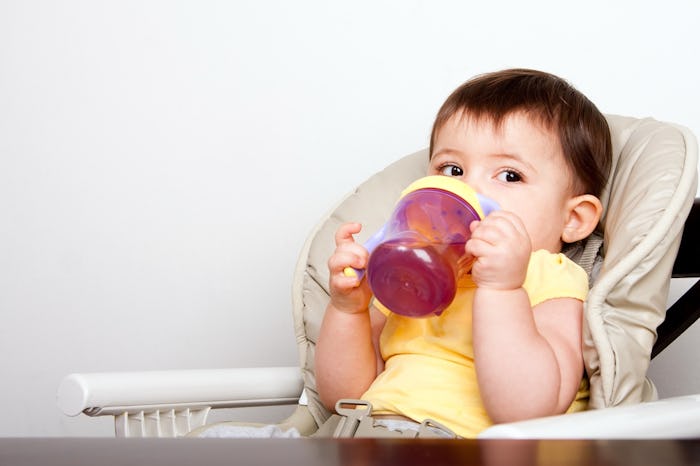Life

Here's How To Know If Your Baby Is *Really* Ready For A Sippy Cup
Baby milestones are exciting for any parent, especially if it's your first time watching one of your little creations grow into toddlerhood. But if you're unsure when you should start making some big kid transitions, don't worry — you're not alone. Going from a bottle to a big kid cup is one of those big changes because it marks the beginning of the end of the infancy phase (noooooo). But is your little one even ready for that transition yet? What are the signs your baby is ready for a sippy cup?
Once your child begins drinking from a sippy cup, you'll see how wonderful it is. Not having to hold a bottle all the time frees up your hands so much, and let me tell you — it's liberating. Having your baby drink from a sippy cup also helps them become more independent because they can learn to drink by themselves. But it's important to keep in mind that there are some milestones that need to be met before you introduce one of the best inventions ever made — the sippy cup. Here's what pediatrician Dr. Vishal Parmar and pediatric nurse practitioner at St. Tammany Parish Hospital Perry Russell have to say about those milestones.
1They Can Sit Up By Themselves
Dr. Parmar tells Romper that babies should have some gross motor skills developed, like being able to sit up unassisted, before they're offered a sippy cup. The reason why is because "it reduces the chance of aspirations and indicates better suck/swallow coordinations," says Dr. Parmar. It's important that your baby can sit up without falling over so they can drink easily without choking. Russell agrees, and tells Romper, "Sitting up unassisted is an indication that she possesses the motor skills to effectively drink from the sippy cup."
2They're At Least 6 Months Old
Dr. Parmar says that your baby needs to be old enough before being offered a drink from a sippy cup. "[Sippy cups] should be offered after 6 month of age because outside milk is easier to digest because of gut maturity." For the first six months, babies drink mostly formula or breast milk, so there's really no need for a sippy cup. Once they begin drinking other liquids, a sippy cup is a nice introduction.
3They're Eating Solid Foods
Is your baby already eating solid foods? If they are, it could mean they maight be ready to try a sippy cup. Russell says that "some babies can begin to transition from their bottle as early as 6 months, around the same time that the American Academy of Pediatrics recommends introducing solid foods."
4They Can Eat From A Spoon
If your baby can swallow food given to them on a spoon without spitting it out or choking, they could be ready for the sippy cup transition. "Eating from a spoon is a sign that she has dropped her tongue-thrust reflex," explains Russell. It's even better if your baby can keep the mouthpiece of the sippy cup in their mouth on their own.
5They Can Grasp Things
If your child is able to grasp things (other than your hair), they may be ready to hold a drink by themselves. Dr. Parmar says that before you offer your baby a sippy cup, they should have "developed radial and or pincer grasp to hold cup by himself." Russell agrees and says, "Once she has learned to grasp an object and better yet — put the object in her mouth — she is capable of holding onto the sippy cup and bringing it to her mouth to drink."